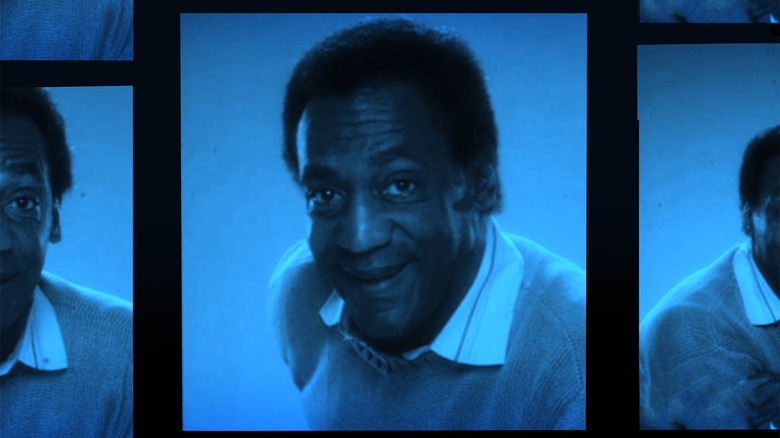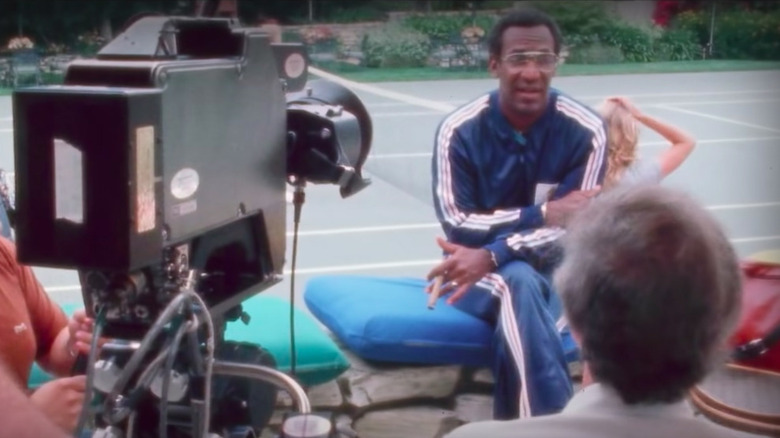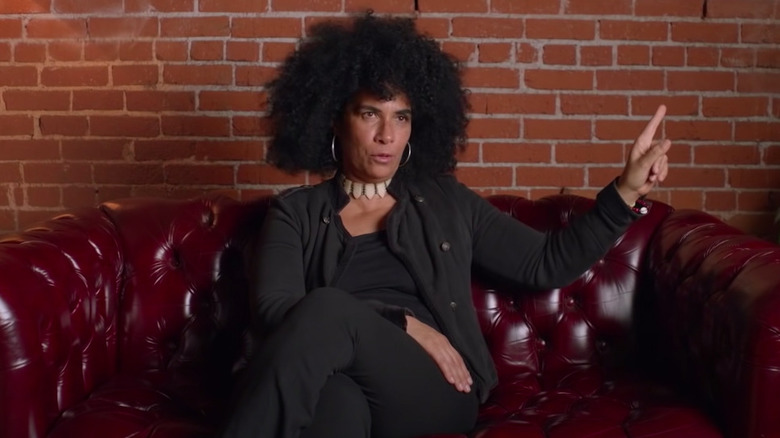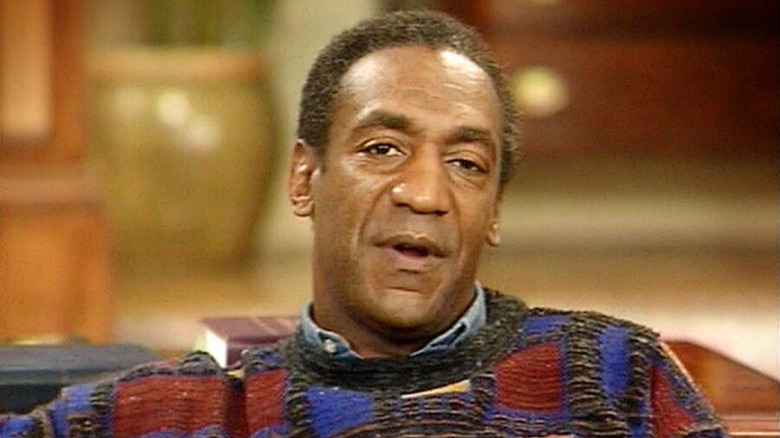We Need To Talk About Cosby Review: No Punches Are Pulled In This Raw Reconciliation Of The Disgraced Icon [Sundance 2022]
In the wake of the #MeToo movement, Hollywood and movie/TV fans have been forced to come to terms with the fact that some of their most beloved performers were actually sexual predators whose horrific behavior went swept under the rug for far too long. But a couple of years before that powerful movement came along, one of the most notorious sexual predators in Hollywood was finally being taken to task by the dozens of women he was accused of raping and assaulting across a career that's spanned over 50 years.
Bill Cosby became the subject of intense scrutiny and investigation when nearly three dozen women came forward in The New Yorker (that number has now reached over 60 women), each with their own horror story of how the beloved comedian, once fondly referred to as "America's dad," used his profile as a kind, trustworthy mentor to allegedly drug, assault, and rape them. Though this was all kickstarted by a now-famous stand-up set from comedian Hannibal Buress in 2014, the sins of Cosby's past began in the earliest days of his career. Comedian W. Kamau Bell doesn't pull any punches in his damning, harrowing, and thorough four-part documentary series "We Need to Talk About Cosby," which tries to reconcile Cosby's legacy as a trailblazing, barrier-breaking, undeniable influence in pop culture and society with the frequent and heinous deeds he was accused of committing every step of the way.
Bill Cosby, Himself
Note: Even though our language in this review uses words like "accusations" and "allegedly" and others like it, we want to make it clear that no matter what the court of law has determined, we believe the women who have accused Bill Cosby of sexual crimes.
You can't have a documentary about the purported transgressions of Bill Cosby without remembering why the comedian was previously so revered. For many, it might just be the groundbreaking sitcom "The Cosby Show," which depicted an affluent Black family without the burden of living paycheck-to-paycheck in the slums of a major city. For others, it's his legendary stand-up sets which have influenced everybody from Jerry Seinfeld to Chris Rock and every comedian in between. But beyond those two major cornerstones of Cosby's career, there's so much more that the comedian accomplished that turned him into a revered and beloved figure.
W. Kamau Bell starts at the very beginning by chronicling the meteoric rise of Bill Cosby's career, which made him a household name in just a few years — an especially incredible feat for a Black comedian in the racially tense 1960s. With the help of comedians, pop culture experts, historians, journalists, scholars, and more as talking heads, Bell hones in on what made Cosby a pure force of entertainment. His clean, charming stand-up routine gave him a reputation as a "raceless" comedian, a descriptor Bell pointedly notes is only a compliment in the eyes of white people. We're also reminded of the importance of his role in the classic TV series "I Spy," which allowed audiences to see an intelligent, cool, and skilled Black man in the world of espionage rather than the dopey, insulting tropes that Black actors and actresses had been relegated to during that time. Even behind the scenes, Cosby was breaking new ground by ensuring that he had a stunt double who was actually Black rather than a white man who was literally painted black.
Each of the four one-hour episodes of "We Need To Talk About Cosby" recounts the many milestones of Cosby's career through each decade in an equally informative fashion. But we all know this isn't a documentary celebrating Cosby's accolades and accomplishments. Why does Bell spend so much time building up Bill Cosby? Because everyone needs to understand how much of a cultural touchstone Cosby became, and how difficult it was for people to not believe the squeaky clean reputation the comedian created for himself. Furthermore, Bell digs even deeper by examining the seemingly calculated fashion by which Cosby intentionally crafted such an image for himself, almost as if he knew it would keep anyone from not only suspecting him of such monstrous actions but also from accusing him of the very misdeeds that he has been accused of frequently carrying out.
Where You Lay Your Head
The most powerful and potent part of "We Need to Talk About Cosby" doesn't come from examining Cosby's career with the hindsight of these sexual assault and rape allegations. However, it should be noted just how creepy and telling some of Cosby's comedy bits — whether in stand-up specials, sitcoms or television interviews — have become in the wake of the comedian's downfall. You'll feel both uneasy and mystified when you hear Cosby openly and gleefully discuss Spanish Fly, an extract from the beetle of the same name that has been categorized as being a sort of aphrodisiac, but actually acts as the equivalent of a roofie. You'll be even more unsettled when a moment from "The Cosby Show" seems to apply similar sexual proclivities to Dr. Cosby's trademark barbecue sauce. But it's the painful recollection of Cosby's many victims that hammers home the despicable acts of this once-beloved star.
The documentary jumps around to various talking heads, archival clips and photos, and moments from Cosby's many shows and specials. But when the time comes for the women who have accused Cosby of manipulating, drugging, assaulting, and raping them, Bell smartly lets the camera sit with each of them so that our attention is squarely focused on every unsettling detail. The graphic memories will make your skin crawl, and equally upsetting are the many women who barely have any memory of what was done to them because of the pills or drinks they were given so they could more easily be taken advantage of while unconscious.
This is where the evil genius of Cosby becomes clear. There are so many similarities between these traumatic memories that it's more than implied that Cosby knew what he was doing every single time he found a new victim. It's also no mistake that Cosby's accusers are almost all in their late teens or early 20s, when young women are most impressionable and easily manipulated in the presence of an older man of respected fame. Many of the women feel foolish for willingly taking pills that Cosby said would help them unwind and have a good time, and it's all because they trusted the man based on his public persona. Several victims recall feeling foolish and embarrassed, thinking it was their own fault for passing out and waking up with no recollection of what transpired. In retrospect, one of the victims refers to Cosby as a master of his craft, "whether it be acting, comedy or raping." It's hard-hitting to say the least.
The achievements of Cosby that are highlighted throughout the documentary are immediately crushed by the weight of these harrowing accusations. But there's another layer to this documentary that's all too important.
It's True, It's True
Even in the wake of so many accusations against Bill Cosby, the Black community found it difficult to believe that their beloved, fatherly icon was guilty. Part of that came from the perception that many of Cosby's victims were white women. Because the Black population has had so many of their own taken from them by the white majority, whether it's through violence or the broken justice system, they had trouble accepting these revelations and were very protective of one of their icons, even as more and more women came forward. The likes of "The Cosby Show" co-star Phylicia Rashad and Whoopi Goldberg also passionately defended Cosby. It took the accusation from Black model Beverly Johnson to help tip the scales, even as a third of Cosby's early accusers were Black women.
Bell, as a Black comedian who grew up admiring Cosby, knows that this is an uncomfortable topic for many Black people to address. How can you accept that the man who made it possible for you to see your own family on television, and paved the way for Black excellence in the media and beyond, may be nothing more than a sexual predator? Is there any way to appreciate all the good that a man did for an entire population while also understanding that he's absolutely despicable? Bell himself asks, "Can you separate the art from the artist, and should you? What happens when the artist you idolize isn't the human being you thought they were? What if that person's artistic achievement, living example, and good works were so great that they changed the world? What then?"
These are the difficult questions that Bell doesn't shy away from asking, even as he admits that it's all f**ked up enough that there were times he felt like walking away from this project entirely, especially when Cosby was released from prison in June 2021, just as he was close to wrapping production on the documentary.
"We Need to Talk About Cosby" is more than effective in tackling the transgressions of the once-respected comedian from every possible angle. Bell provides ample context to understand the significance of Cosby's career and his prominence in the public eye in order for us to understand how he would have been able to get away with raping so many women for so many years without facing any consequences before the past decade. But he is also careful to analyze the challenges and hesitation that comes with taking down a pop culture icon who has had such a positive impact on so many people's lives, even as he seems to have brought unforgettable trauma upon dozens of women.
For some, addressing the Bill Cosby problem is as simple as acknowledging that he's a rapist who once had a popular TV show. For others, it's much more complicated. The documentary doesn't provide a definitive answer one way or the other, opting to let the doc's many subjects offer their own perspectives, including Bell himself. But it offers enough thoughtful rumination and insight that you can decide for yourself.
/Film Rating: 10 out of 10



